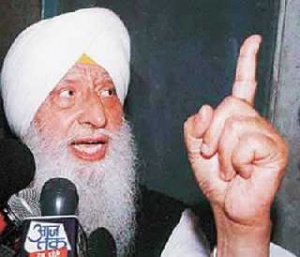Jagjit Singh Chauhan: Difference between revisions
Allenwalla (talk | contribs) m (→The Final Years: removed ref note 1 as no refs included) |
No edit summary |
||
| Line 49: | Line 49: | ||
[[Category:politicians]] | [[Category:politicians]] | ||
[[category:Khalistan]] | |||
Revision as of 09:31, 21 July 2008
Jagjit Singh Chauhan was the original founder of the Khalistan movement that seeks to create an independent Sikh state.
Chauhan, a Sikh, grew up in Tanda in Punjab's Hoshiarpur district, about 180 km from Chandigarh. A medical practitioner, Dr. Chauhan was first elected to the Punjab Assembly from the Tanda as a candidate of the Republican Party of India in 1967. He became Deputy Speaker when the Akali Dal-led coalition Government took office in Punjab. When Mr. Lachhman Singh Gill became Chief Minister, Chauhan was made Finance Minister. In 1969, he lost the Assembly election.
In Exile
Khalistan "currency"
In 1971 he moved to the United Kingdom. In 1971, he went to Nankana Sahib in Pakistan to attempt to set-up a rebel Sikh government. He them visted USA at the invitation of some supporters. On Oct 13, 1971, he placed an advertisement in the New York Times proclaiming an Independent Sikh state. In 1977, he returned to India.
He migrated again to Britain in 1979. In London, Chauhan created an organization "Khalistan National Council" and ran its operation from a building termed "Khalistan House". He remained in contact with Sant Jarnail Singh Bhindranwale. Chauhan also maintained contacts among various groups in Canada, the USA and Germany. He visited Pakistan as a guest of leaders like Chaudhuri Zahoor Elahi. Chauhan declared himself president of the "Republic of Khalistan", named a Cabinet, and issued Khalistan "passports", "postage stamps" and "Khalistan dollars". It is reported that with the assistance of a wealthy Californian supporter, a peach magnate, he opend an Ecuadorean bank account to support his operation.
Harimandir Sahib, Bhindranwale and Indira Gandhi's murder
On 19 July 1982, Sant Jarnail Singh Bhindranwale, who was accused of the murders of Lala Jagat Narain and Baba Gurbachan Singh Nirankari, moved into the sanctuary of the Harimandir Sahib (Golden Temple) complex. According to reports he fortified the complex and began to stockpile weapons. In June 1983, Bhindranwale was asked: "Sant Ji, if Jagjit Singh Chauhan attacks Hindostan with assistance from England, America, and Canada, whom will you help?". Bhindranwale hedged and did not indicate his support.
To flush out Bhindranwale and his supporters from the Harimandir Sahib, a government operation was undertaken on June 5-6, 1984 in which Bhindranwale was killed.
On June 12,1984 in London Chauhan was interviewed for his reaction in an BBC interview. The interviewer asked: "Do you actually want to see the downfall of Mrs. Gandhi's Government?" Chauhan answered: "..within a few days you will have the news that Mrs. Gandhi and her family has been beheaded. That is what the Sikhs will do..". After this interview, Thatcher government curtailed Chauhan's activities. The British government had also instructed him to confine his activities within the bounds of democracy and the laws of the land.
On June 13, 1984, Dr. Jagjit Singh Chauhan announced a government in exile. On 31 October 1984, Indira Gandhi was asssinated.
Chauhan visited Japan in November 1987.
His Indian passport was cancelled on April 24,1989 by the Indian High Commission after he visited India and hoisted the flag of Khalistan at a gurdwara at Anandpur Sahib. India raised a storm when he was allowed to enter USA using the canceled passport.
Vancouver fundamentalist Talwinder Singh Parmar and Surjan Singh Gill were at one time aligned with Chauhan.
Softening and Return
Chauhan gradually softened his stance. He supported India's attempts to defuse the tension by accepting surrenders by the militants. Other organizations, mainly in UK and North America, continue to work for a Khalistan.
India government first permitted his wife to return. Chauhan himself returned to India in June 2001, after an exile of 21 years. The government decided to overlook his past activities.
After his return, in an interview Chauhan said he would keep the Khalistan movement alive "democratically" and claimed that he has always been against violence.
He appears to have gone back to his Rajput roots. He is said to have suggested he is a descendant of the legendary king Prithviraj Chauhan of Delhi and he can assist in getting the remains of Prithviraj Chauhan back to India from Afghanistan.
He is said to have rekindled his old friendship with Indian politicians, including childhood friend and now a senior communist leader Harkishan Singh Surjeet. A reporter writes:
- 'Says Dr Chauhan, "When I told him about my decision to come to India, Surjeet didn't believe me and said, 'Oye tu nai aayenga India vich', to which I replied, 'Mein zaroor aavenga'" (You won't come to India... sure, I'll come").'
The Final Years
Soon after Chohan returned to India, he started a political party named the Khalsa Raj Party, apparently with the aim of propagating the cause of Khalistan through peaceful means. In a 2004 interview he claimed that Khalistan will be formed in 2007. When asked
"Has the recognition by the Unrepresented Nations and Peoples Organisation [U.N.P.O.] at the Hague given a boost to the movement? "He said: Yes. Apart from that we already have three-four M.P.s in the British Parliament. Kashmir has four-five M.P.s. Our movement is coordinating with the Kashmiris.
He died on April 4, 2007 at his native village Tanda in Hoshiarpur District of Punjab, where he ran a charity hospital. He was 78.

